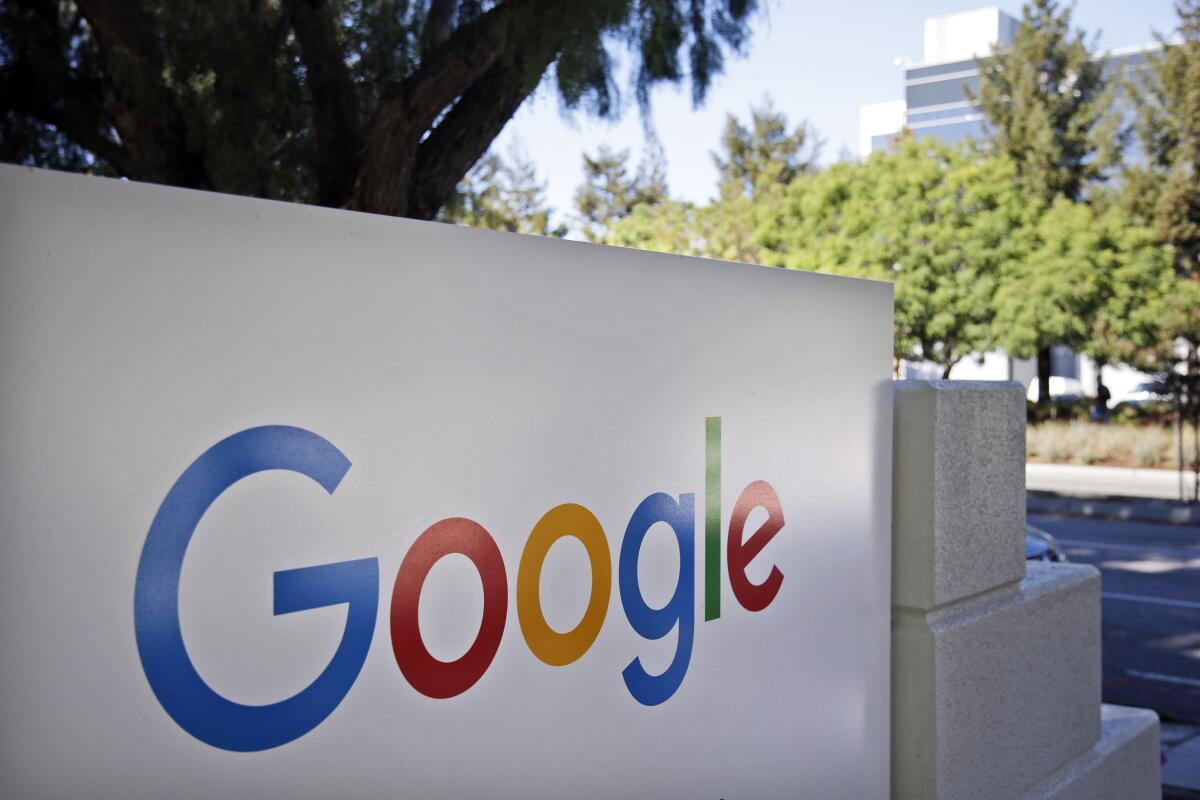U.S. sues Google, calls for breakup of ad technology ‘monopoly’

- Share via
The U.S. Justice Department and eight states Tuesday sued Alphabet’s Google, calling for the breakup of the search giant’s ad technology business over alleged illegal monopolization of the digital advertising market.
“The lawsuit we have filed today seeks to hold Google to account for what we allege are its longstanding monopolies in digital advertising technologies that content creators use to sell ads and advertisers use to buy ads on the open Internet,” Justice Department antitrust chief Jonathan Kanter said in a news conference Tuesday announcing the suit.
New York, California and Virginia were among the states that signed on to the complaint, which was filed in federal court in Virginia.
Google said in a blog post that the lawsuit “attempts to pick winners and losers in the highly competitive advertising technology sector. The case “largely duplicates an unfounded lawsuit by the Texas Attorney General, much of which was recently dismissed by a federal court. DOJ is doubling down on a flawed argument that would slow innovation, raise advertising fees, and make it harder for thousands of small businesses and publishers to grow.”
Alphabet’s stock extended declines on the news, dropping as much as 2.5% to touch a session low. The stock slid 23% in the 12 months that ended Monday, underperforming the Nasdaq 100 index.
“No matter the industry and no matter the company, the Justice Department will vigorously enforce our antitrust laws,” Atty. Gen. Merrick Garland said during the news conference.
The lawsuit represents the Biden administration’s first major case challenging the power of one of the nation’s largest tech companies, following through on an investigation that began under former President Trump. It also marks one of the few times that the Justice Department has called for the breakup of a major company since it dismantled the Bell telecom system in 1982.
Google is the dominant player in the $278.6-billion U.S. digital ad market, controlling most of the technology used to buy, sell and serve online advertising. The Justice Department said Google’s dominance enables it to keep at least $0.30 out of every dollar advertisers spend through its online advertising tools. A resolution in the case could be years away.
“Google’s pervasive power over the entire ad tech industry has been questioned by its own digital advertising executives,” according to the complaint. “The analogy would be if Goldman or Citibank owned the NYSE.”
The lawsuit marks the Justice Department’s second antitrust suit against Google and the fifth major case in the U.S. challenging the company’s business practices. State attorneys general have filed three separate suits against Google, alleging it dominates the markets for online search, advertising technology and apps on the Android mobile platform in violation of antitrust laws.
A deep dive into how tech giants Amazon, Apple, Google and Meta joined forces to defeat two antitrust bills that had once enjoyed bipartisan support.
Justice Department antitrust chief Kanter said during the news conference that Google engaged in 15 years of anticompetitive conduct, including a “pattern of acquisitions to obtain market dominance.”
Those include the 2007 acquisition of online advertising giant DoubleClick for $3.1 billion, which the Justice Department is now seeking to unwind, the 2010 deal to buy Invite Media for $81 million and the 2011 purchase of AdMeld for $400 million.
The Justice Department’s complaint also seeks damages from Google, allegedly stemming from overcharging federal government agencies, such as the U.S. Army, that purchased online ads. The agency said the U.S. government has spent more than $100 million on online display advertising since 2019, but the complaint didn’t indicate how much the Justice Department is seeking to recoup.
The allegations in the Justice Department’s suit mirror those brought by attorneys general in 16 states as well as Puerto Rico in 2020. That lawsuit is pending in federal court in New York.
The Mountain View, Calif.-based company is No. 1 in the $626.9-billion global digital ad market, according to 2023 estimates by research firm EMarketer, with the U.S. representing the biggest piece. Alphabet’s ad operations are expected to bring in $73.8 billion in U.S. digital ad revenue in 2023. Most of that, $58.50 billion, comes from Google’s search advertising business. The remaining $15.3 billion is from display ads. Google runs an ad-buying service for marketers and an ad-selling one for publishers, as well as a trading exchange in which both sides complete transactions in lightning-fast auctions.
These exchanges operate like online stock-trading platforms with an automated bidding process. Competitors and publishers have complained that Google leverages parts of this vast network, such as its ad exchange, to benefit other areas and kneecap rivals. Google alone is expected to generate some $65.7 billion in digital ad revenue in the U.S. this year, representing about 26.5% of the market, while YouTube represents 2.9%, according to EMarketer.
The company’s market share has slipped over time from a high of 37.4% of U.S. digital ad spending in 2015, according to EMarketer.
Google argues that the market for online advertising is a crowded and competitive one. In court filings and congressional testimony, the company has noted that its rivals include other major players in the ad tech market such as Amazon.com, Meta Platforms and Microsoft.
Google becomes the latest tech company to trim staff as the economic boom that the industry rode during the COVID-19 pandemic ebbs.
The department’s scrutiny of Google’s control of the ad tech market goes back to the Trump administration. The Justice Department under then-Atty. Gen. William Barr sued Google over its search business instead, alleging that the company used exclusive distribution deals with wireless carriers and phone makers to lock out competition. That case is due to go to trial in September.
The agency continued the investigation into advertising technology under Biden. After Kanter was confirmed to lead the antitrust division in November 2021, Google asked the Justice Department to review whether Kanter should be recused from all actions involving the company because of his past work representing its critics. Kanter was barred from working on Google’s monopoly investigations while the Justice Department deliberated on his potential recusal. The Justice Department ultimately ruled that Kanter can work on cases related to Google.
More to Read
Inside the business of entertainment
The Wide Shot brings you news, analysis and insights on everything from streaming wars to production — and what it all means for the future.
You may occasionally receive promotional content from the Los Angeles Times.












